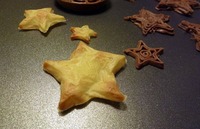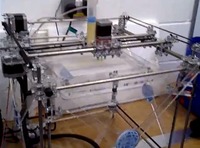 The folks at Bits From Bytes are experimenting with Food Printing, which seems to be a growing area of interest for hungry 3D print operators. BfB have evidently been trying to print mashed potatoes, something we haven’t seen before. They seem to have been successful, judging from the images and video. BfB is collaborating with Deborah Southerland of the Centre for Fine Print Research at the University of the West of England in Bristol on this culinary technology adventure.
The folks at Bits From Bytes are experimenting with Food Printing, which seems to be a growing area of interest for hungry 3D print operators. BfB have evidently been trying to print mashed potatoes, something we haven’t seen before. They seem to have been successful, judging from the images and video. BfB is collaborating with Deborah Southerland of the Centre for Fine Print Research at the University of the West of England in Bristol on this culinary technology adventure. But it’s not without some issues. In the video they indicate the syringe-like extruder is running at a slow 16mm/sec rate, perhaps the slowest typical setting for printing plastic. They are unsure whether this can be increased, meaning food prints (of at least potatoes) are destined for slow production.
But it’s not without some issues. In the video they indicate the syringe-like extruder is running at a slow 16mm/sec rate, perhaps the slowest typical setting for printing plastic. They are unsure whether this can be increased, meaning food prints (of at least potatoes) are destined for slow production.  There’s also the issue of getting the potato material to stick to the surface, and more importantly removing the printed potato item without destroying it. Imagine trying to pick up a shape made of uncooked extruded potato – you might as well just use a spoon! We suspect printing low-profile shapes on wax paper might be the way to go, as you could simply lift the wax paper and prints all at once and put them in the oven for solidifying, erm, cooking.
There’s also the issue of getting the potato material to stick to the surface, and more importantly removing the printed potato item without destroying it. Imagine trying to pick up a shape made of uncooked extruded potato – you might as well just use a spoon! We suspect printing low-profile shapes on wax paper might be the way to go, as you could simply lift the wax paper and prints all at once and put them in the oven for solidifying, erm, cooking. Via YouTube


Ah – but everyone wants to know – how did it taste???
Ah – but everyone wants to know – how did it taste???
We initially printed the potato onto greaseproof paper, but as you can see in the top image we also printed direct onto a teflon coated piece of aluminium which was then put in the oven to bake the potato. It worked a treat, and the potato was easily removable from the non-stick surface.
We initially printed the potato onto greaseproof paper, but as you can see in the top image we also printed direct onto a teflon coated piece of aluminium which was then put in the oven to bake the potato. It worked a treat, and the potato was easily removable from the non-stick surface.